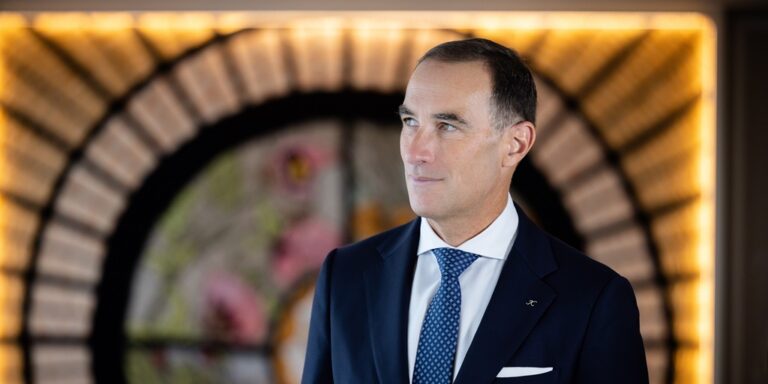Camil Yazbeck outlined the brand’s aims and ambitious signing targets within a company which now signs on average a hotel deal a day.
Writing a new chapter
Plans for the Handwritten Collection have been in the offing for over a year, according to Yazbeck: “We noticed there was a gap in Accor’s portfolio for a collection brand within the midscale sector. Handwritten completes our collection verticals, with Emblems in the luxury segment and MGallery in premium.
“It matches the growing demand amongst independent hoteliers who want to leverage the benefit of a larger organisation such as Accor to maximise revenue with access to sales distribution and a loyalty platform.”
Launch motivation
He further revealed the thought process behind introducing the brand: “Hotels remain a very attractive asset class for investors as they clearly continue to attract customer demand. They also provide high returns versus offices or retail sites.
“The consumer today is more attracted to hotels that are designed locally for those who live in the neighbourhood, and which are trendy destinations in themselves. For example, the Millennial generation are now entering their 40s and have a high level of disposable income that they spend on experiences versus consumer goods.”
Exacting requirements
With the majority of Handwritten sites intended to be conversions from independent hotels, the collection has very exacting requirements as to which properties will be suitable to come under its umbrella. Yazbeck detailed: “They need to already be really good hotels in their markets, qualitative in product, service and experience. Handwritten curates charming hotels with a strong, unique personality, and we retain their name and identity, which is really important for owners and the local community.
“Handwritten’s personality and personal touches are what makes it different from other brands. There will be subtly staged touchpoints throughout each of the hotels that reflect the passion of the owner.”
Brand standards
Yazbeck underlined that it is simple for independent hotels to join the collection: “Our partners have already invested in creating a certain style for their hotel, so the conversion will require limited investment. We assess each site and it goes through a lot of detailed work with our developers, design technical services and operational team, so joining the Accor family means our owners don’t need to do a complete remodelling, and this also makes it environmentally friendly.”
Drilling down into precise property specifications, Yazbeck explained that each site will have to have an entrance plate, a welcome ritual, quality beds, brand-referenced bathrooms, minimum standards for sheets and towels, flatscreen TVs in all guestrooms, room service, a bar, a breakfast buffet with a minimum of two homemade products, a service table for hot drinks and a 24-hour food and beverage offer.
Ambitious target
With 13 sites, stretching from western Europe to Australia, already on the books before the brand’s official launch, Accor has an ambitious target to reach 250 Handwritten hotels by 2030.
Yazbeck is confident this objective can be reached: “As soon as we reached out to some key owners they’ve been banging on my door all the time telling me this is what they need. Handwritten has massive global appeal everywhere, especially with so many beautiful independent hotels around the world.”
Something for everyone
But as the holder of the most diverse portfolio in the industry with over 40 brands, is there a danger of over-saturation at Accor? Not according to Yazbeck: “Today you have to think about customer trends, owner and investment profile and criteria in this business. Accor has traditionally been strong in the economy segment but now we have great diversification in midscale and above, so the objective has been to respond to the distinctive needs of guests and partners across all these segments.
“I believe the power of a successful company is to look at future trends and this is exactly what we are doing. Our group’s ability to offer the most diversified portfolio in the world allows us to stand out in a very crowded market. We can offer what customers and partners demand to be the right brand fit.”
With this in mind, will there be any further brand launches coming soon? “We have nothing expected at this time,” said Yazbeck. “We monitor the market closely and we react accordingly if opportunities arise, but we are very careful adding any brand because we have to make sure that we are adding it for the right reason – for the customer and the owners – and that it’s got the right system in sustainability practices, which is important for us.”
Development push
With approximately 400 signings last year, equating to more than one a day, and an equivalent number of openings, the group’s pace shows no sign of slowing.
Yazbeck emphasised that Accor has made a very strong development push in the last decade, carving out a global leadership position in the luxury and lifestyle segments to build on its economy and midscale global number one status. “As we expand we will continue to lead the way and support investors with all the challenges that are inherent to the hotel business,” he commented.
“The beauty of having a global company and catering to different segments is that we will grow where the demand is. In some areas there will be more focus on the premium, economy and midscale segment whereas in other regions we will push on luxury, it really depends on where the demand is for which type of segment.”
Green projects
While Accor doesn’t have specific targets for a ratio of newbuild versus conversion projects, Yazbeck analysed: “Newbuilds have to be very well done and very sustainable, so whatever you spend at the beginning of the process on carbon footprint needs to be zeroed out afterwards. Conversions are easier because you already have a hotel so you don’t have to spend so much to make it happen. However you have to invest to make sure that the systems are upgraded and eco-friendly, even if the hotel is old. We have to grow in the right way, in an environmentally-friendly manner.
“Construction costs are all over the place right now, so I believe opportunities will come more towards conversion. But there will always be opportunities in development where you regenerate the area, as long as it’s done in a very responsible fashion.”
Restructuring benefit
Towards the end of last year, Accor reorganised its group into two divisions, economy, midscale and premium, including the ibis, Novotel, Mercure, Swissôtel, Mövenpick, Pullman and now Handwritten brands; and luxury and lifestyle, bringing together the company’s luxury lines including Raffles, Orient Express, Fairmont, Sofitel and MGallery, as well as the group’s lifestyle entity, Ennismore.
This switch has seen Yazbeck’s own job title change from senior vice president, head of development to global chief development officer, premium, midscale, economy brands. He feels that these updates can only benefit the group’s developments, going forwards. “The group’s recent transformation will allow us to be a more brand-led organisation which will ultimately allow us to be more successful, efficient and focused. We are still the big Accor family and we all have the same mission, vision, values and objectives, but we now have very clear responsibilities as to who does what.
“Brands will remain the key driver for the group’s future growth. As an ex hotel owner I think it’s absolutely amazing to have a team dedicated to premium, midscale and economy because they don’t have any other responsibilities to think about. They can focus on how to make these brands more successful, more environmentally friendly and more locally relevant to neighbourhoods.”
Positive future
At end-September 2022, Accor had a hotel portfolio of 789,152 rooms/5,357 hotels and a pipeline of 212,000 rooms/1,218 hotels, so there looks to be a positive outlook for the group.
Yazbeck summed up; “Development is the engine that drives Accor. Over the last several years our network has continued to expand, so the group is now very dynamic and is a hospitality leader. Our renowned brands provide us with a strong and steady flow of market growth opportunities. We’ve enjoyed a healthy net growth and we expect this trend to continue for the foreseeable future.”






